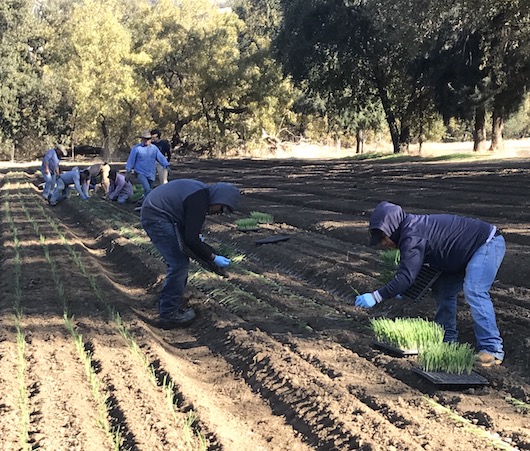
Thanksgiving News From the Farm —
We recently had a meeting of our Crew Supervisors and listened to them echoing themes that we ourselves have been discussing: “There are not enough crew members here on the farm to do the work. Each of our crews needs at least 5 or 6 people, and we often have only 2 or 3 people trying to do the work of 6. The only solution is to cut back crop production 20% across the board.”
Basically, our crew is pointing out to us the fact that every year we hopefully plant, irrigate, weed and care for our beautiful crops, but often leave too many of them in the field because of the labor shortage that so many other farmers are also experiencing. The crux of this labor shortage has to do with the fact that the majority of US farm workers are immigrants, they always have been immigrants and most future farm workers will be immigrants as well. With the current crackdown on immigration from Mexico and Central America, and the lack of public policy that would allow immigrants to work in the US legally, the stress on US agriculture is increasing. Construction and Landscaping, which also rely on immigrant labor are in the same quandary. And the labor shortage can be especially difficult for organic farmers growing labor intensive fruits and vegetables and often needing proportionally more labor because of a greater amount of hand weeding on organic farms.
Full Belly often hosts groups of people who want to learn more about organic agriculture. As we walk around the farm, visitors often question us about our employees. There is a common understanding that farm workers do work that is physically demanding — hard work — but also very important work. Our visitors very often express appreciation and admiration for our crew, as do us farm owners who take the opportunity to thank our crew each and every day, knowing that many of them come from rural parts of Mexico and Central America for many different reasons, often leaving family and friends behind. The fact that so many of them live in fear of deportation is just one part of this California agriculture puzzle that doesn’t add up to much more than a travesty.
As she has every year since 1990, Senator Feinstein introduced her “Blue Card” bill again this year (called the Agricultural Worker Program Act). The bill would legalize current undocumented farm workers and create a path to a green card in as little as three years. (The green card provides the right to live in the US permanently.) Until getting the green card, the farm worker would not be eligible for government programs nor Obamacare subsidies, but at least they would be able to work legally. There is also a bill that has been introduced in the House (Farm Workforce Modernization Act) which provides work visas for existing farm workers. If either of these bills passed, it would be a huge improvement over the current situation, but despite that possibility, we seem to be a long way off from designing immigration policies that incorporate future farm workers and sustain US agriculture.
There is much to be grateful for on a farm – miracles that unfold each day in the soil, the crops and the gifts of the land. We are all the beneficiaries of those that worked before us, adding their hands to the collective effort. We will make this Thanksgiving week one in which we give thanks to the farm workers all around the world and over the millennia — Let’s all give thanks to the farm workers this Thanksgiving!
—Judith Redmond

Planting onions
